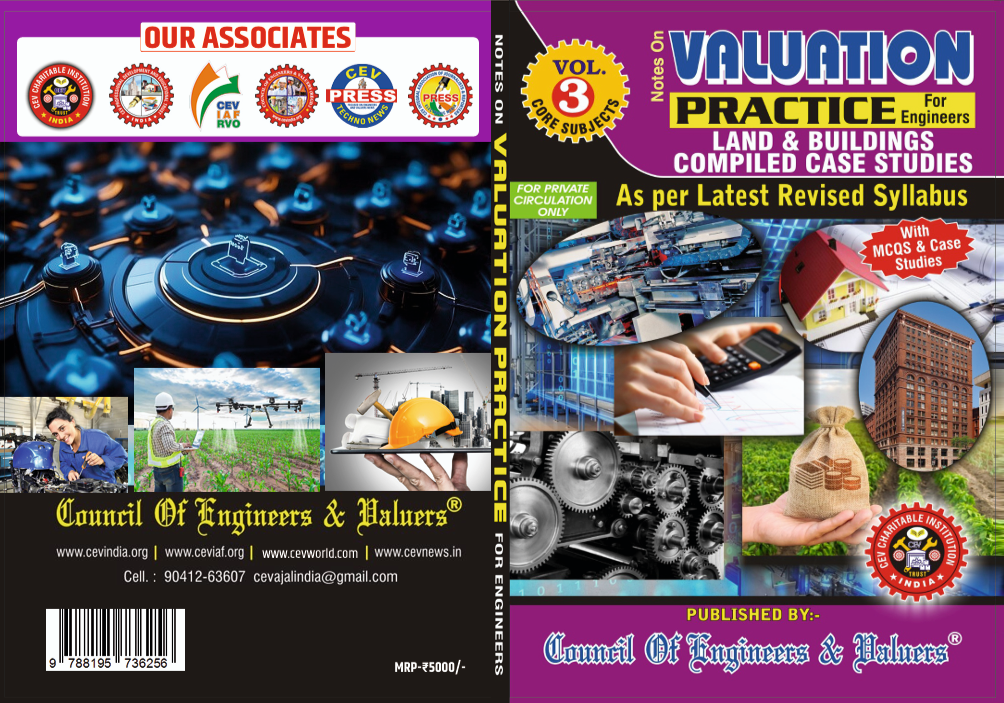TRANSFORMING PROPERTY PARTITION IN INDIA: LEGAL REFORMS, VALUATION STANDARDS & THE ROLE OF PROFESSIONALS
By Er. Sundeep Bansal
Published in: CEV Techno News, Renowned Newspaper for Engineering & Valuation Practice
For Professionals in Engineering, Valuation, and Land Administration
In a landmark move aimed at enhancing transparency, equity, and efficiency, recent changes in India’s property partition laws have redefined the way inherited or jointly owned properties are divided. These reforms are particularly significant for professionals in the fields of engineering, property valuation, and law, as they emphasize structured documentation, digital integration, and expert involvement.
This article delves into the key updates, processes, and implications of the new legal framework governing property partition, especially from the perspective of practicing and aspiring professionals in valuation and property assessment.
I. Legal Backbone: Equal Rights for Daughters
The Supreme Court’s verdict affirming the equal rights of daughters in ancestral property—regardless of marital status or the father’s date of death—has reshaped the traditional understanding of Hindu Succession Law. This progressive step mandates that daughters, like sons, are coparceners by birth in joint Hindu family property under the Mitakshara law.
Professional Implication:
Legal and valuation practitioners must now ensure gender-neutral asset distribution, necessitating inclusive data collection and updated family trees when preparing property reports or ownership assessments.
II. Structural Overhaul: New Procedural Norms
The procedural framework for property partition has undergone significant modernization to reduce ambiguities and ensure equitable distribution among stakeholders.
1. Mandatory Detailed Documentation
Partition documents must now contain comprehensive information about:
-
Property type (residential, commercial, agricultural)
-
Geographical location and jurisdiction
-
Extent and measurement
-
Encumbrances, if any
-
Agreed mode of partition (physical division or sale and division of proceeds)
This structured approach brings much-needed clarity and enforceability.
2. Independent and Certified Valuation
Valuation must be conducted by certified valuers registered under regulatory bodies such as the Institution of Valuers or under the Companies Act. These experts are tasked with determining fair market value, considering factors such as:
-
Prevailing market rates
-
Land use and zoning regulations
-
Development potential
-
Depreciation in case of built-up structures
-
Comparable sales method or income approach
Professional Implication:
Valuation practitioners must adhere to uniform standards (IVS or Indian Valuation Standards by ICAI-RVO) and maintain impartiality to withstand legal scrutiny.
III. Embracing Technology: Digitization and Records
The requirement for maintaining digital records of partition deeds and supporting documentation marks a pivotal move toward e-governance. These digital records are stored in property registration databases and state revenue portals for future reference and audit.
Benefits:
-
Prevents document tampering
-
Provides accessible and retrievable evidence in case of disputes
-
Facilitates integration with land record modernization initiatives like the Digital India Land Records Modernization Programme (DILRMP)
IV. Resolving Disputes Amicably: Arbitration as an Option
The law now recognizes arbitration as a valid mechanism to address disagreements between co-owners regarding valuation, entitlement, or distribution. This provision reduces the burden on courts and offers a speedier resolution pathway.
Process Overview:
-
Consent-based selection of arbitrator
-
Confidential and less adversarial environment
-
Binding arbitration award enforceable under the Arbitration and Conciliation Act, 1996
Professional Implication:
Valuers and engineers may be called upon as expert witnesses or neutral advisors in arbitration settings, emphasizing the need for accurate and defensible reports.
V. Time-Bound Execution: 90-Day Completion Mandate
The new rules prescribe a 90-day timeline (extendable in exceptional circumstances) for completing the partition process from the date of initiation. This ensures timely closure and reduces prolonged family disputes.
VI. Practical Guide: Steps for Partition Under New Rules
| Step | Description |
|---|---|
| 1. Property Description | Create a detailed inventory including maps, measurements, and use-type. |
| 2. Valuation | Engage certified valuers for market-based assessment. |
| 3. Partition Proposal | Draft proposal detailing how assets will be shared. |
| 4. Registration | Register partition deed with the Sub-Registrar under the Registration Act, 1908. |
| 5. Record Entry | Update mutation and digital land records accordingly. |
VII. Challenges and Professional Solutions
| Challenge | Recommended Professional Approach |
|---|---|
| Disagreements among parties | Advocate arbitration to resolve amicably and avoid litigation. |
| Disputed valuation | Use multiple valuation methods and justify through transparent documentation. |
| Legal complexities | Engage legal professionals for compliance and due diligence. |
| Data inconsistency in land records | Cross-verify with revenue records, GIS data, and field surveys. |
VIII. Key Takeaways for Professionals & Aspirants
-
Legal Acumen: Understanding of Hindu Succession Act and property law is now essential for valuation professionals.
-
Interdisciplinary Skills: Knowledge of legal, engineering, and economic aspects of real estate is vital.
-
Professional Ethics: Impartiality and due diligence in valuation are no longer optional—they are legal necessities.
-
Technology Adoption: Digital literacy for accessing online land records and preparing electronic documents is increasingly critical.
A Call to Professional Excellence
The revamped property partition rules reflect a maturing legal and administrative framework in India, centered around transparency, equity, and speed. For professionals in engineering, valuation, and property law, these changes present both a responsibility and an opportunity—to contribute meaningfully to dispute resolution, uphold fairness, and set new standards for ethical and competent practice.
By integrating legal awareness, technical expertise, and digital proficiency, professionals can become key enablers in India’s journey toward a more just and efficient property distribution regime.
Disclaimer: This article is intended for educational and professional guidance. For case-specific tax advice, consult a qualified Chartered Accountant or legal advisor.
About the Author:
Er. Sundeep Bansal is a Chartered Engineer and an IBBI-registered valuer under the Companies Act, with a specialization in Real Estate. He regularly advises on complex valuation disputes, tax planning, and regulatory compliance, and is a contributor to leading industry journals.



